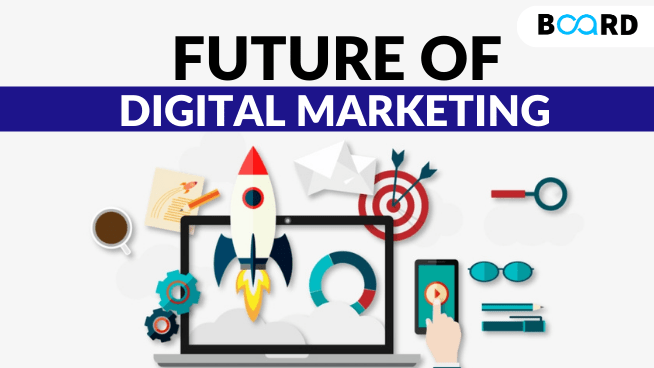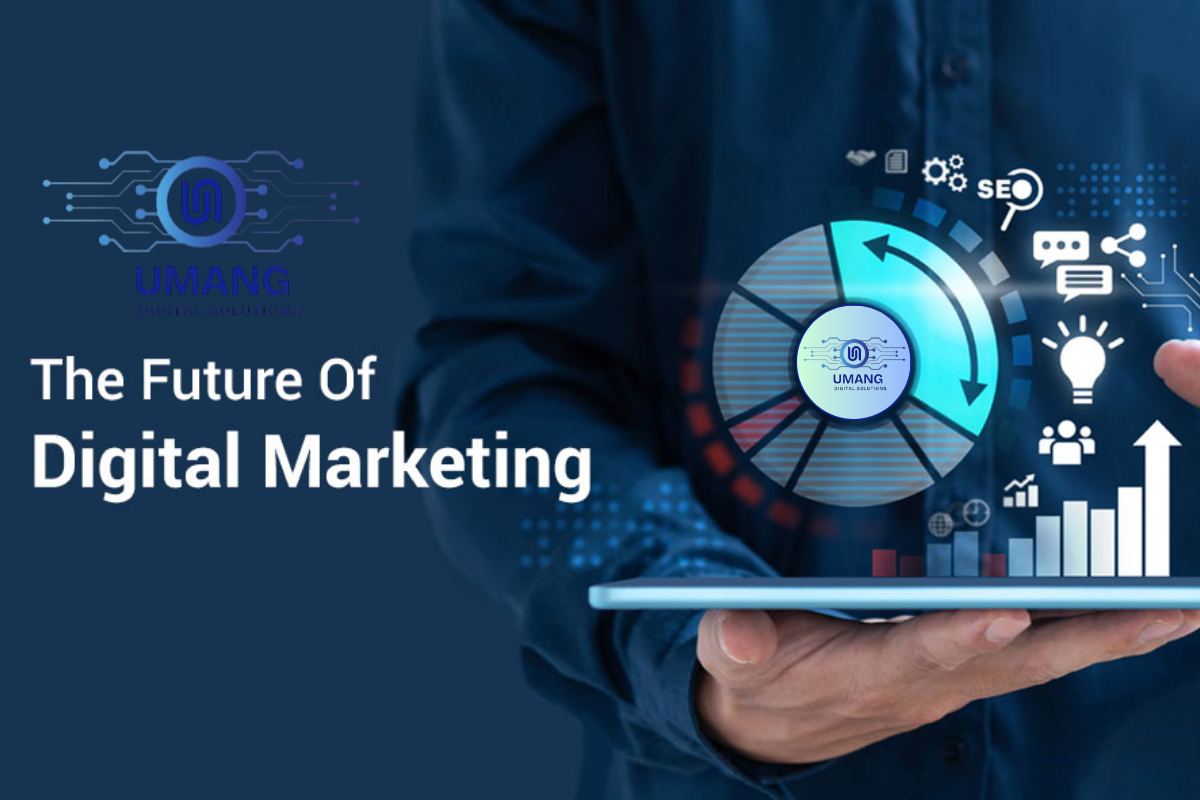Future of Digital Marketing
Trends, Innovations, and Predictions
Because of the internet's dynamic nature, shifting customer behaviors, and technology improvements, the field of digital marketing is always changing. Businesses that wish to stay ahead of the curve in the twenty-first century must comprehend what digital marketing will look like in the future. This blog will examine cutting-edge technology, developing trends, and forecasts influencing digital marketing in the future.
UmaNg
- Rise of Artificial Intelligence (AI) in Marketing
- Growing Influence of Video Content
- Expansion of Voice Search and Smart Speakers
- Importance of Data Privacy and Ethical Marketing
- Evolution of Influencer Marketing
- Merging Virtual Reality (VR) and Augmented Reality (AR)
- Rise of Programmatic Advertising
Rise of Artificial Intelligence (AI) in Marketing
AI-Powered Personalization
Delivering highly tailored experiences with artificial intelligence is one of the biggest trends in digital marketing. Large-scale data analysis is done by AI algorithms to comprehend the preferences, actions, and past purchases of customers. This makes it possible for marketers to produce ads, product recommendations, and content that are specifically suited to each user.
AI-driven technologies, for instance, can dynamically modify the content of websites according to the location, demographics, and previous interactions of a visitor. This degree of customization boosts client loyalty and conversion rates in addition to improving the user experience.
Chatbots and Conversational Marketing
AI-powered chatbots are quickly becoming a crucial component of customer care and engagement programs. These virtual assistants are available around-the-clock to take care of questions from customers, answer them, and even process orders. They can also give product information. The advancement of AI technology has led to the development of increasingly intelligent chatbots that can comprehend and provide answers to intricate queries, ultimately enhancing customer happiness and streamlining operations.
Predictive Analytics
AI is also transforming how companies predict consumer behavior and trends. Machine learning algorithms are used in predictive analytics to evaluate past data and forecast future results. This makes it possible for marketers to plan ahead for client needs, optimize campaigns, and make data-driven choices. Businesses can take proactive steps to keep consumers by using predictive analytics to identify future churn.
Growing Influence of Video Content
Short-Form Video Content
Younger viewers have been interested in short-form video content due to its popularity on platforms like TikTok, Instagram Reels, and YouTube Shorts. These short films are entertaining, simple to distribute, and might become viral. Companies are taking advantage of this trend by making brief films that are both educational and entertaining and that appeal to their target market.
Live Streaming
Live streaming has been quite popular since it allows for real-time involvement and discussion, particularly during the COVID-19 pandemic. Through Q&A sessions, product debuts, and live events, marketers can engage with their audience on platforms such as Facebook Live, Instagram Live, and Twitch. Live streaming is an effective tool for brand promotion and customer engagement because it promotes authenticity and a sense of community.
Interactive Videos
Videos that are interactive let users interact with the content, creating a more engaging experience. Interactive elements like branching situations, quizzes, and clickable hotspots offer a customized viewing experience and boost viewer retention. Interactive videos are a more interesting method for brands to express their stories, conduct product demos, and provide tutorials.


Expansion of Voice Search and Smart Speakers
Voice Search Optimization
Voice search is becoming more and more common as smart speakers like the Apple HomePod, Google Home, and Amazon Echo become more popular. It's predicted that voice searches would account for more than half of all queries by 2024. Due to this change, marketers must make their content voice search-friendly by emphasizing conversational language and long-tail keywords.
Voice Commerce
Voice instructions are being used by customers to make purchases in a new trend known as voice commerce, or v-commerce. Businesses need to improve their e-commerce platforms for voice interactions as this convenience-driven shopping approach gains traction. Personalized recommendations and smooth voice-activated transactions are essential for success in this new market.
Importance of Data Privacy and Ethical Marketing
GDPR and CCPA Compliance
Strict rules for data collection and usage have been established by data privacy regulations such as the California Consumer Privacy Act (CCPA) and the General Data Protection Regulation (GDPR). Businesses must place a high priority on data protection and transparency as privacy concerns and data breaches grow more widespread. Adherence to these laws is not only mandated by law but also serves as a means of fostering customer trust.
Ethical Marketing Practices
Customers are expecting ethical marketing methods as they become more aware of how their data is utilized. Companies that put an emphasis on honesty, integrity, and transparency in their marketing campaigns have a higher chance of establishing enduring relationships with their clients. This entails getting express consent, being transparent about how data is used, and offering simple ways to opt out.
Evolution of Influencer Marketing
Micro-Influencers and Nano-Influencers
The landscape of influencer marketing is changing, with a transition from micro- and nano-influencers (followers between 10,000 and 100,000) to macro-influencers (followers between millions of). These smaller influencers frequently have more genuine ties with their audience and higher engagement rates. Companies are realizing how important it is to work with micro- and nano-influencers in order to target specific markets and create real connections.
Authenticity and Transparency
An increasing amount of emphasis is being placed on authenticity and transparency as influencer marketing develops. Consumers are expecting real advice and disclosures from sponsored material and are growing more dubious of it. Influencers are more likely to keep followers' confidence and credibility if they remain genuine and disclose their brand affiliations in an honest manner.
Merging Virtual Reality (VR) and Augmented Reality (AR)
AR in Retail and E-Commerce
Customers may now see things in their surroundings before making a purchase thanks to augmented reality, which is revolutionizing the retail and online shopping experiences. Applications for augmented reality allow users to preview furniture and home decor in their living area as well as virtually test on clothes, accessories, and cosmetics. Customer satisfaction is increased and purchase reluctance is decreased by this immersive and interactive experience.
VR in Marketing Campaigns
Immersion experiences provided by virtual reality can be leveraged in marketing initiatives to establish memorable brand encounters. Virtual reality (VR) captures attention and helps brands stand out from the competition, whether it is used for product demos, virtual tours, games, or brand experiences. VR technology will be more integrated into digital marketing tactics as it becomes more widely available.
Rise of Programmatic Advertising
Automated Ad Buying
Using AI and real-time bidding to target certain demographics, programmatic advertising automates the purchasing and selling of internet advertisements. Marketers are able to target the correct audience with highly relevant adverts at the right moment thanks to this efficiency. Moreover, programmatic advertising provides thorough statistics and insights that support ongoing optimization and increased return on investment.
Personalization and Targeting
Utilizing data, programmatic advertising provides individualized ad experiences based on user behavior, interests, and demographics. This degree of targeting raises the efficacy and relevancy of ads, improving user interaction and conversion rates. Ad personalization and precision will increase with the development of programmatic technologies.
Rapid technology breakthroughs, changing customer behavior, and a growing focus on ethics and personalization will all shape the future of digital marketing. Businesses may manage the ever-changing digital landscape and achieve long-term success by embracing creative techniques and remaining up to date with current trends.
Marketers need to adopt AI in order to provide outstanding user experiences as it continues to transform customization, predictive analytics, and customer service. Businesses must modify their content and SEO strategy in light of the increasing impact of voice search, video content, and smart speakers. Building trust and enduring consumer connections also requires giving ethical marketing, transparency, and data privacy top priority.
Programmatic advertising, augmented reality, virtual reality, and influencer marketing have all evolved to provide brands with intriguing new methods to interact creatively with their audience. Businesses may remain ahead of the curve and prosper in the cutthroat digital marketplace by incorporating these trends into their digital marketing strategies.
Digital marketing has a promising and exciting future. Mastering digital marketing in the future will require embracing change, utilizing technology, and placing a high value on authenticity and customer trust.

